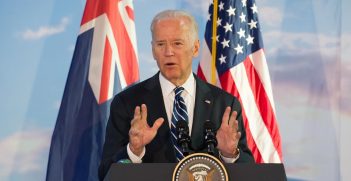The Morrison Doctrine

International relations would be good fun if we could cherry-pick the sort of globalism we liked and reject the sort which we did not. But we can’t.
Dear Prime Minister,
I see you are developing a foreign policy doctrine of your own. Good. We haven’t had one for a while.
Congratulations on taking this stuff seriously. The management of our external environment will be your toughest job as prime minister. Our external challenges are of a scale not seen since the Pacific War.
I hope you don’t mind a few comments – and a bit (actually quite a lot) of rough with the smooth. I won’t go into the Pacific Step Up. Enough has already been written.
Obviously the first pillar of your doctrine is the American Alliance. You said in your recent Lowy lecture, the Alliance is “our past, present and our future.”
Well, OK . If you must – on the basis that hyperbole matters.
More seriously, the Alliance has in the main served us well and remains central to our security. But it has developed elements not always in our national interest.
Indeed ANZUS and the Alliance have become different things.
As you know, ANZUS is an agreement between Australia and the United States to consult whenever in the opinion of one of them, the territorial integrity, independence or security of either is threatened in the Pacific.
The Alliance has become a catchall phrase to encompass our doing what the United States wants on matters of security. Our various military undertakings in West Asia and the Middle East –including the recent promise of a ship in the Strait of Hormuz are examples. (I note that we seemingly pushed away the American suggestion we base intermediate range missiles here. Wise! Missiles on our soil would inter alia have made the Indonesians ecstatic!)
But the Alliance has not been ever thus.
Leaving aside Mr Whitlam’s approach in 1972 on Vietnam, in 1985, Mr Hawke successfully explained to then Secretary of State George Schultz our disinclination to be involved in monitoring MX missile testing from Australia.
In 1988, Hawke pursued APEC (an economic entity, but one which would self-evidently have an impact on regional political discourse) by getting agreement in Asia first and having the Americans invited to join later.
In 1995 Mr Keating concluded a Security Treaty with Indonesia in secret and then explained it to the Americans.
These leaders were on the other side of politics to your government. But in all these instances, the Americans accepted our actions. And both Hawke and Keating enjoyed serious American respect throughout their tenures.
Our strategic environment is different from two decades ago and I accept we might need to do some things differently now. But beyond this obvious point, we seem to be dealing with President Trump and his current Fourth Eleven as if they were Americans driven by the normal imperatives of state – and in so doing losing our self respect. Trump and his push are not the likes of the Bushes, Schultz, James Baker or Colin Powell.
The current Biden/Ukraine/Downer/Mueller issue is an example.
A wise rule of diplomacy – unless you are big enough to break it – is to stay out of the domestic politics of other countries. Hence it was a pity fulsomely to volunteer in May to assist Trump in providing material obviously intended to attack Mr Mueller, by all accounts about as straight a man as you could meet, and Trump’s political opponent, Joe Biden.
This approach will win no points with decent Republicans and will not be forgotten by the Democrats. For us, the whole Biden/Ukraine/Downer/Mueller issue should have been handled strictly as a technical legal matter – and only when assistance was actually requested.
Your second doctrinal pillar is China. I give you more points than some others might. You and your ministers – if not all in your party – have been more careful in your calibration of language and policy on China than we were two years ago. You know only too well our economic stake in China. It is also a great power and merits respect.
Your approach to the trade war has been thoughtful. There also seems to be some understanding in Canberra that China – in the light of both the pivot under Obama and the ferocity of the Pence speech in October last year, let alone the trade war – has real grounds for concern about American policies towards it.
But while it has never been clearly explained in Australia why a Huawei 5G network in the UK and Germany might be managed with proper regard to the security interests of those countries but not here, there are genuine grounds for concern about aggressive Chinese behavior in our region, Chinese cyber activity and Chinese behavior in our universities.
In your Lowy speech, you talked about not having to make a binary choice between China and the United states.
Such a view implies that the approaches we adopt in dealing with United States-China competition must rely on skilful navigation rather than a series of cold hard choices.
Your third pillar – where you place serious emphasis on our dealings with our major partners in the region – was well put. Hopefully your thinking will lead to the development of an Australian conceptual approach to the region which sees the latter less in terms of an Australian-United States-China triangle and more in terms of a constantly adjusting set of regional relationships. When one set alters, it impacts on the others.
Continuing on Asia, while your initial handling of Indonesia – given the Jerusalem folly – was not elegant , much of the damage has been repaired.
And you are making a serious effort with our important neighbours – Japan, India and some of the ASEANs .
But Australians have to realize that the main regional players all have bigger security issues with China than we do. So countries like Vietnam, China and India have carefully nuanced policies. Skilful and delicate coordination of policy should be the order of the day. With the possible exception of within ASEAN itself, we should attempt to develop policies in common – not a common policy.
To be frank, your fourth pillar is disturbing and bad policy. This is your castigation in the Lowy speech of what you termed “the negative globalism that coercively seeks to impose a mandate for an often ill-defined global community.”
While the drafting of your speech was less than precise, I understood you to be saying that the rules-based international order brought into being by the United States in great part to prevent a reoccurrence of the horrific wars of the last century, and the support of which has been central to Australian foreign policy since the Pacific War, are not worth much unless the rules in that order specifically suit us.
This approach has a number of problems. We do have to cooperate with each other – all the more in a globalized world. That is why we have treaties.
One country’s idea of negative globalism is another’s of positive globalism. So you negotiate. You can’t insist on what you like and reject what you don’t like. For example, things can get tricky if you like international trade rules but don’t like the majority view on climate change.
Or if you don’t like China’s actions in the South China sea, but are not too worried if Israel decides to annex the Golan Heights or the West Bank.
International relations would be good fun if we could cherry pick the sort of globalism we liked and reject the sort which we did not. But we can’t.
We need rules and middle and smaller powers need them more than big ones. Ask the little kid in the playground.
And Prime Minister – statements like “we can never answer to a higher authority than the people of Australia.” Come off it: You are better than Trump or Boris. Let’s not get into this sort of cant. You are a good enough politician to avoid it.
The global environment gives you opportunities to go down as a great foreign policy prime minster. You seem to mean business. But the Morrison doctrine needs work.
Yours sincerely
John McCarthy
John McCarthy AO FAIIA has served as Australian ambassador to seven countries, including the US, Indonesia, Japan and India. He is the immediate past national president of the Australian Institute of International Affairs.
This article originally appeared on October 9 on Pearls and Irritations. It has been lightly edited.





